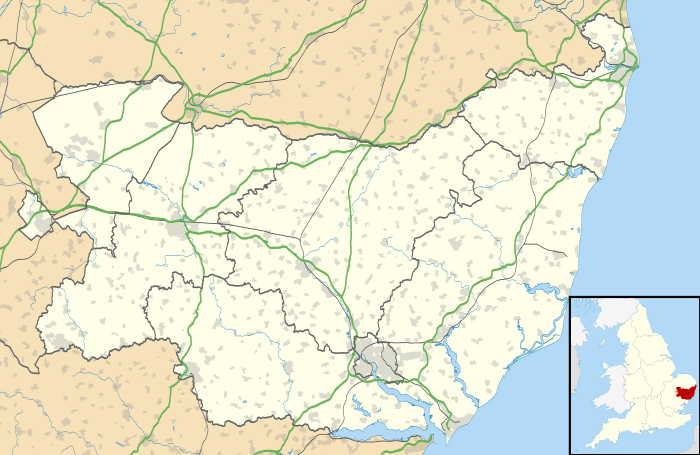Grundisburgh
| Grundisburgh | |
 St. Mary's church, Grundisburgh |
|
 Grundisburgh |
|
| Population | 1,584 (2011) |
|---|---|
| OS grid reference | TM223509 |
| District | Suffolk Coastal |
| Shire county | Suffolk |
| Region | East |
| Country | England |
| Sovereign state | United Kingdom |
| Post town | WOODBRIDGE |
| Postcode district | IP13 |
| Dialling code | 01473 |
| Police | Suffolk |
| Fire | Suffolk |
| Ambulance | East of England |
| EU Parliament | East of England |
| UK Parliament | Central Suffolk and North Ipswich |
Coordinates: 52°06′45″N 1°14′46″E / 52.11241°N 1.2462°E
Grundisburgh is a village of 1,584 residents situated in the English county of Suffolk.[1] It is in the Suffolk Coastal district, six miles north-east from Ipswich and four miles north-west of Woodbridge located on the B1079. Flowing through the village are the rivers Lark and Gull. The village is recorded in the Domesday Book as "Grundesbur", "Grundesburg", "Grundesburh" or "Grundesburc".
The village has a primary school, a Church of England church and a Baptist chapel as well as one pub, the Dog. The Grundisburgh and District News is a newspaper which is published by volunteers every three months and provides news for Grundisburgh and the surrounding villages and hamlets. There are two fords in the village. The village is the setting for A Wicked Deed by Susanna Gregory.
Grundisburgh Primary School is a medium-sized school with 131 pupils at the time of the last Ofsted inspection. It is located in a modern building in Alice Driver Road which was built in 1989 after spending 115 years at the Old School next to St Mary's Church. The Old School building has now been converted into affordable housing, which was opened by John Gummer MP in July 1994.
Governance
An electoral ward in the same name exists. This ward stretches south to Kesgrave with a total population of 2,306.[2]
Notable natives and residents
- Bartholomew Gosnold (1571–1607), explorer and colonist instrumental in the settlement of Virginia, and namer of Martha's Vineyard and Cape Cod, was born in Grundisburgh.
Notable buildings
Basts, just to the east of the church, is a Tudor building, built around 1520 by salter Thomas Awall.[3] The father of his wife, Alice, was the master cook to Edward IV and Henry VII.
St Mary's Church is the largest place of worship in the village and is of the Church of England denomination. The earliest parts of St Mary's Church, which is a Grade I listed building, date from approximately 1300 but as a building it was extended in the 15th century with the addition of a clerestory.[4] The second expansion of the church came in 1527 when Thomas Awall built - or renovated - the Lady Chapel. The most iconic part of the church is the 18th-century brick tower built between 1731 and 1732 at the bequest of Robert Thinge, who has a commemorative plaque in the tower.[4] The Tower also is the home of the Millennium Time Capsule that was sealed into the wall in 2000. It can be claimed that there are three towers of St Mary's Church, the current 18th-century tower, the original 14th-century flint tower and the 19th-century plan to clad the brickwork in flint and top the tower with a spire. Within the church itself is a fine Suffolk hammerbeam roof and a rare mural of St Christopher dating from the 14th century, which is the largest of its type in the county.
Grundisburgh Baptist Chapel was built in 1798 and is one of the earliest dissenting religious buildings in the area. It is situated on the edge of the village and has been widely refurbished over the last few years. This included replacing the historic wooden pews with seats.
Post Mill Gardens mark the location of a mill built in 1807 which worked until 1929. After part-demolition in 1930, the remains were made part of a house. Another mill, a miniature smock mill, stood a short distance north-west of the post mill until its demolition in about 1957.
References
- ↑ "Parish population 2011". Retrieved 14 September 2015.
- ↑ "Ward population 2011". Retrieved 14 September 2015.
- ↑ Bast's, Grundisburgh, British Listed Buildings. Retrieved 2011-04-20.
- 1 2 Church of St Mary, Grundisburgh, British Listed Buildings. Retrieved 2011-04-20.
External links
| Wikimedia Commons has media related to Grundisburgh. |